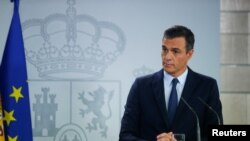Acting Prime Minister Pedro Sanchez on Tuesday called a snap election for Nov. 10, Spain's fourth in as many years, after failing to secure support from rival parties to confirm him as premier and allow him to form a government.
Sanchez acted after King Felipe VI said there were no viable candidates to lead a new government. The king, who is the head of state, had earlier consulted all key political leaders to verify whether a deal to put together a government was still possible in a deeply fragmented parliament.
"There is no majority in (parliament) that guarantees the formation of a government, which pushes us into a repeat election on Nov. 10," Sanchez told an evening news conference, pinning the blame squarely on the opposition.
Spain, with the fourth largest economy in the European Union's euro currency zone, has been in political limbo since Sanchez's Socialists emerged as the biggest party in April's election but failed to nail down a parliamentary majority.
In July, parliament twice rejected his confirmation bid, and this week was his last opportunity to form a government.
Opinion polls show a new election might not end the impasse, with the Socialists still unable to win enough seats in the 350-seat parliament to secure a majority on their own.
Party leaders had spent more time publicly blaming each other for the impasse than negotiating, and a flurry of last-minute calls and initiatives failed to achieve a breakthrough.
Although Spain's economy has not suffered greatly, financial analysts say further delays in implementing reforms in areas such as labor and pensions could finally start to bite.





